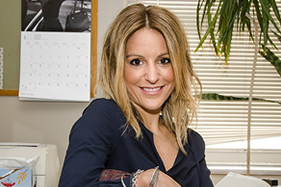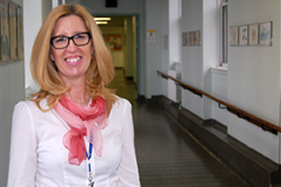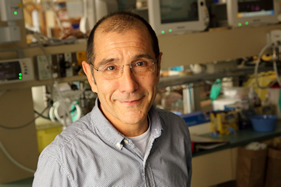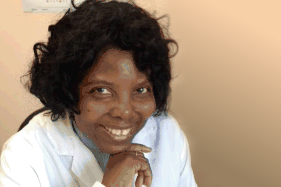It is National Social Worker’s Month!
At the McGill University Health Centre (MUHC) our social workers practice their art across all of our hospitals. They specialize in different areas of healthcare, but they all deliver the same compassionate care. We took a sneak peek into the lives of some of our social workers. We hope this short series honours their important contribution in delivering the best care to our patients and families, day in and day out.
 Véronique Després, Social Worker, Outpatient Oncology, Montreal General Hospital, MUHC
Véronique Després, Social Worker, Outpatient Oncology, Montreal General Hospital, MUHC
The best part of my job is the privileged exchanges I have with my patients, who tell me about the worries caused by their cancer diagnosis, their treatment and sometimes their poor prognosis. I take the time to listen to patients and I increase awareness among the medical team concerning the invasive impacts of cancer on their lives. I look for resources and creative solutions to the problems they face, such as frequently travelling to the hospital, dealing with family responsibilities or suffering a lack of income. In fact, what I like the most is the teamwork with the patient, the family and the healthcare team. I tell my patients that I am on their team and they are part of mine.
![]()
 Nathalie Cloutier-Fons, Social Worker, Montreal Neurological Hospital, MUHC
Nathalie Cloutier-Fons, Social Worker, Montreal Neurological Hospital, MUHC
I work in a multidisciplinary team composed of doctors, residents, a clinical nurse, nurses, a neuropsychologist, an occupational therapist, a physiotherapist, people from spiritual care and more. To provide the best care to our patients and families, daily communication with this team is required.
For example, we conduct screening of cases. A bedside nurse may inform me that a patient is crying a lot and is very anxious so I will visit and assess him/her. Illness, new diagnoses and surgery can often cause a great deal of anxiety. Patients and families are helped through individual, couple and family counseling. Together, we also coordinate discharge planning and link our patients to community partners.
In addition, I share an educational role with the clinical nurse in educating patients and families about their disease. We communicate on a daily basis.
![]()
 Kimberly Brown, Social Worker, Internal medicine, Royal Victoria Hospital, MUHC
Kimberly Brown, Social Worker, Internal medicine, Royal Victoria Hospital, MUHC
Being a social worker, particularly in a healthcare setting, has been a goal of mine ever since I began working in a hospital as a unit coordinator. Working in various departments (i.e. Birthing Centre, Medicine, Geriatrics, and Psychiatry) has provided me with the opportunity to be exposed to people of various cultures, languages, and populations. More importantly, as a frontline worker I was able to foster and develop skills such as empathy, patience, and teamwork.
Since becoming a social worker, I have had the opportunity see how the healthcare system can impact a patient and/or their family. I have also been able to understand how our clinical work can make a difference in the lives of patients and their families, particularly as we assist them in coping with the experiences of their diagnosis and with the obstacles that they may have to encounter.
![]()
 Debbie Lewis, Professional Social Worker, Montreal Chest Institute, MUHC
Debbie Lewis, Professional Social Worker, Montreal Chest Institute, MUHC
As a social worker there are many patient stories that have stuck with me. Recently, however, I worked with a patient who was admitted to the Montreal Chest Institute with respiratory distress. The man learned that he was suffering from a serious lung cancer. This unexpected diagnosis was heartbreaking since he planned on retiring the following year. His condition deteriorated rapidly thereafter and he eventually required palliative care. I spent some time talking with him, but I mostly spent time with his wife, who was his caregiver. Each person faces this situation differently and I supported her throughout this journey. Her husband eventually passed away a few months later. Several weeks after his death, she came to visit me in my office unexpectedly to express her gratitude for the help I gave her and her husband during that difficult time. Hearing that my work had such a positive impact in the life of this couple really touched me.
![]()
 Kevin Brady, NICU at the Montreal Children’s Hospital, MUHC
Kevin Brady, NICU at the Montreal Children’s Hospital, MUHC
Kevin Brady is one of two full-time social workers assigned to the MCH Neonatal Intensive Care Unit (NICU). Patients are sent to the NICU for intensive evaluation and treatment, and the social workers provide assessment and service to almost all families who are admitted. He finds the NICU an exciting place to work, and says the teamwork approach is what keeps him motivated.
“It’s ultimately the family that has to adapt to providing care for their child,” says Brady. “But every family is different, and it’s important to carry out a comprehensive assessment to attend to the individual needs of each family.” That means taking into consideration the family’s make-up and structure, their cultural and religious beliefs, their adaptation and coping skills, and their education. The social worker also facilitates communication, researches community resources, and helps with discharge planning, all of which makes them an indispensable partner in the family’s care.
![]()
 Marie-Carmélite Millien, Social Worker, Lachine Hospital, MUHC
Marie-Carmélite Millien, Social Worker, Lachine Hospital, MUHC
As a social worker working at the Lachine Hospital for about 20 years, I consider the most important part of my job in the 21st century is to never forget that we work with vulnerable human beings. We must see the human being as a whole, treat him/her with respect, justice, love and dignity. People face life with stressful problems that destabilize and can make them dysfunctional. We must listen with empathy and create a bond of trust, to share knowledge and restore power. Taking into account peoples’ environments, we should encourage them to change and find ways to help them. Focusing on their well-being and avoiding infantilizing attitudes, we ensure that our interventions respect their dignity and a perspective of equitable social justice.
![]()